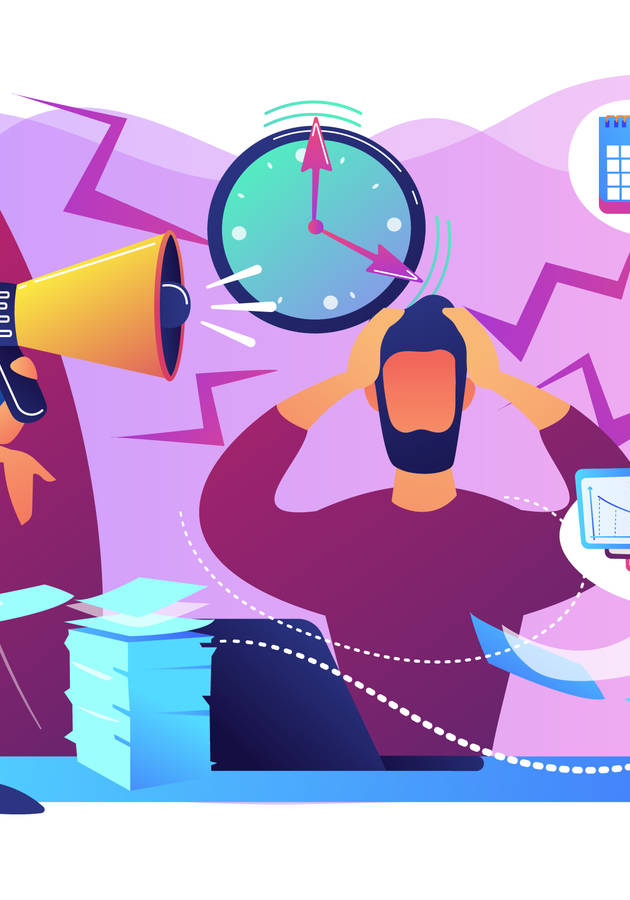It’s not even noon, and you’ve already had enough with your day! How can it be any different? Two of your three phones are ringing, you just got an SMS on the third one, your colleague won’t stop talking about personal problems, and nobody understands that the deadline of your project is just around the corner!
The last thing you’d want at this moment is probably someone telling you that all this stress is actually good for you! And, yet, we’re planning to take the risk!
OK, by “we” – we actually mean Stanford psychologist Kelly McGonigal. And by “taking the risk,” we mean providing you with a summary of her book “The Upside of Stress.”
So, don’t get mad at us.
Join us instead.
How stress earned its bad reputation
You may be thinking that the only upside of stress is the feeling of relief you’re overcome with once it is finally gone.
But, no, McGonigal isn’t talking about anything even remotely similar! Her objective in “The Upside of Stress” is to give back stress its good name. Yeah, right!
Did it ever have one? Well, technically, you’re correct! Stress never really had a good reputation. But the strange thing is, it didn’t have a bad one either. It had both. Since the very beginning.
Let us go back to the 1930s and meet a Hungarian-Canadian endocrinologist called Hans Seyle. While injecting rats with different types of hormones, he noticed that the rats’ reaction was repeatedly the same: ulcers, weakening of the thymus, swelling of the adrenal cortex, among others. Now, strangely enough, Seyle noticed that human bodies reacted the same way after receiving certain types of bad news. But here’s where the story gets really interesting! Receiving good news produced similar reactions at the very same places! Only this time, the stress didn’t harm the body and was, for lack of a better word, beneficial!
Many people know that Seyle invented the word “stress.” In fact, he’s the reason why, no matter where you’re living in the Western hemisphere, you’re probably using the same word to describe this type of response from your organism.
A lesser-known fact, however, is that Seyle started differentiating, later in his career, between two types of stresses: “distress” and “eustress.” The words translate literally to “bad stress” and “good stress.”
“There is always stress,” he said in a 1970s interview, “so the only point is to make sure that it is useful to yourself and useful to others.”
Beyond the Fight-or-Flight Response Mechanism
So, yes, there is such a thing as “good stress”! And it’s as old as the other kind! The reason why you can’t fathom this is probably evolution.
You see, our ancestors lived in an environment of bears and lions. And, when faced with either one of them, their bodies were not merely stressed, but stressed out! The heartbeat, the adrenaline, the tight muscles – that was evolution’s way of telling them to either fight or flee.
But, there’s a big difference between a lion and a job interview! Your brain has evolved enough to make the difference. So, it has added at least two other options in your response repository: the challenge and the tend-and-befriend response.
In the challenge response, your body is as focused and confident as if you’re fighting a lion – minus the fear. It’s your body’s way of telling you, “the fight is on, and we have nothing to lose.” So, you can really rock the world of those around you and do things unimaginable in the mind of the regular you.
A tend-and-befriend response, on the other hand, liberates oxytocin to the body and makes you feel much more compassionate; it gives both courage and the need to connect. It’s a variation of the fight response. It’s your body telling you, “Why flee? They don’t mean any harm. We have nothing to lose.”
And that’s how stress – eustress, positive stress – can make you a better person! Who would have thought? Stress seems to be your enemy only if you believe it is!
“The shocking scientific finding”
We know that the last sentence of the previous section sounds as if pulled out of one of those think-this-think-that books that have helped virtually no one.
Strangely enough, science supports it. Or, at least, a scientific survey.
In 1998, this survey asked 30,000 Americans how much stress they had experienced in the past year and whether they believed stress was harmful to their health. Eight years later, the researchers started rummaging through public records to see what had happened to these people in the meantime.
The bad news? Highly stressed people fearing that stress was bad for them didn’t go well. Many of them died, and, with the numbers crunched, it turned out that this particular group of people was 43% more likely to die than any other group.
But, that’s not the whole story! You see, highly stressed people who didn’t think that stress was bad for them had low mortality rates. How low? Well, lower than those who led low-stress or stress-free lives!
Let us rephrase that: if you are stressed on a daily basis, but don’t think that this is bad for you, you are living at least as healthy as a stress-free Tibetan monk.
Based on their findings, the researchers estimated that during the eight years between the original study of 1998 and the scouring of public records in 2006, around 182,000 Americans died prematurely because of the belief that stress was harming their health. So, once again: not because of their stressful lives, but simply because they believed that their stressful lives were bad for them.
According to McGonigal, that would make “believing stress is bad for you” the 15th leading cause of death in the United States, killing more people than skin cancer, HIV/AIDS, and homicide!
A meaningful life is a stressful life
Now that’s one title you thought you’d never read, right?
At least intuitively, a meaningful life should be the very opposite of a stressful life. After all, philosophers and scientists alike rarely describe it without linking it to some feelings and states which are arch-enemies of “stress,” such as “calmness,” “peace,” and “serenity.”
Strangely enough, another wide-ranging survey seems to suggest that they are all wrong.
Between 2005 and 2006, researchers from the Gallup World Poll asked 125,000 people, over age 15 and from 121 countries, one pretty straightforward question: “Did you feel a great deal of stress yesterday?”
Expectedly, in industrialized nations, the poll was conducted via phone surveys, and in developing countries and remote regions, the pollsters went door-to-door.
After the results came, the researchers computed an index of national stress, i.e., what percentage of a country’s population answered the above question with a clear-cut “yes.”
At 43%, the United States came in pretty high, but not as high as the Philippines, which took the top spot at 67%. Mauritania was the least stressed country: only 5% of the people from this African country felt stressed-out the day before being polled.
This got the researchers thinking how was it possible that inhabitants of countries with so many problems, on average, felt less stressed than those from the world’s wealthiest and most developed nations.
No matter how much they played around with the data, the results were worryingly the same: the more stressed a country is, the longer and better the lives of its people are. McGonigal calls this the stress paradox: stress-free lives don’t seem to guarantee happiness, and happy lives are almost guaranteed to include stress.
How could that be? Well, simply put, because higher levels of stress seem to go along with the very things that make our lives meaningful: love and partners, families and babies, careers and jobs, overall satisfaction with our lives.
A 2013 study at Stanford and Florida State University made this connection quite explicit. It found out that people who report the highest number of stressful events in their past are also the ones who are most likely to consider their lives meaningful.
Now the title doesn’t seem that counter-intuitive, does it?
So, don’t think twice: embrace your stress today
There’s also another thing about stress: it is a very powerful resource. Have you heard stories about mothers being able to lift a truck to save their children? Well, that’s stress for you right there!
Stress makes you feel focused and excited, confident, and energized. If you believe that stress is good for you, it will be: suddenly, instead of hindering your capabilities, it will help you start performing at the height of your powers!
There are many experiments that prove this, but here’s one very simple you can try today. Designed by Harvard Business School professor Alison Wood Brooks, the test asked if it is better being calm or excited before giving a presentation in front of a large crowd. Brooks interviewed hundreds of people and needed to check if crushing the majority of 91% were right about it.
The majority thought the best advice was to try to calm down. After all, if we’re honest, before reading “The Upside of Stress,” we thought that too.
However, when Brooks divided her students into two groups and told half of them to soothe themselves by repeating the “I am calm” mantra before the presentation, and the other half to motivate themselves by constantly repeating “I am excited” – the results demonstrated the very opposite.
The “excited” group handled the pressure of the event more gracefully and performed far better than the “calm” group. In general, they were the more competent, the more engaging, and the more persuasive speakers.
Why? Because they embraced their stress and channeled it into strength. That’s what the truck-lifting mothers instinctively do, and that’s why you’re capable of going over 300 pages during a single night before your exam – and still pass it.
So, embrace your stress!
As Brooks demonstrated via her simple experiment, using its power to your benefit is just a simple mindset intervention away from you! Don’t believe us?
Well, please, do yourself a favor and compare the quality of essays written in a stress-free and a stressful tight-deadline state of mind. Which one was better? Yeah, we thought so.
Final Notes
Dubbed as “a fascinating tour of cutting-edge research” by Charles Duhigg, “a courageous, counterintuitive, and convincing case for a big idea” by Adam Grant, and “a perfect how-to guide for anyone who wants to tap into the biology of courage and the psychology of thriving under pressure” by Daniel Pink, “The Upside of Stress” contains all the surveys and data, and all the advice and tools you need to make stress work for you.
The best part: even if you think that the studies McGonigal cites are inconclusive, even if you believe that some of her arguments are not convincing, and even if you doubt the veracity of the central thesis of her book – following her instructions would still work, because placebo or not, the effects of reinterpreting stress are very real.
Trust us. Because you’ve probably tried McGonigal’s tactics already – you just didn’t know it yet.
12min Tip
Instead of allowing stress to get the better of you, embrace it, and use it to your benefit. To that end, write on a piece of paper “a meaningful life is a stressful life” and put the note just above your desk.





























